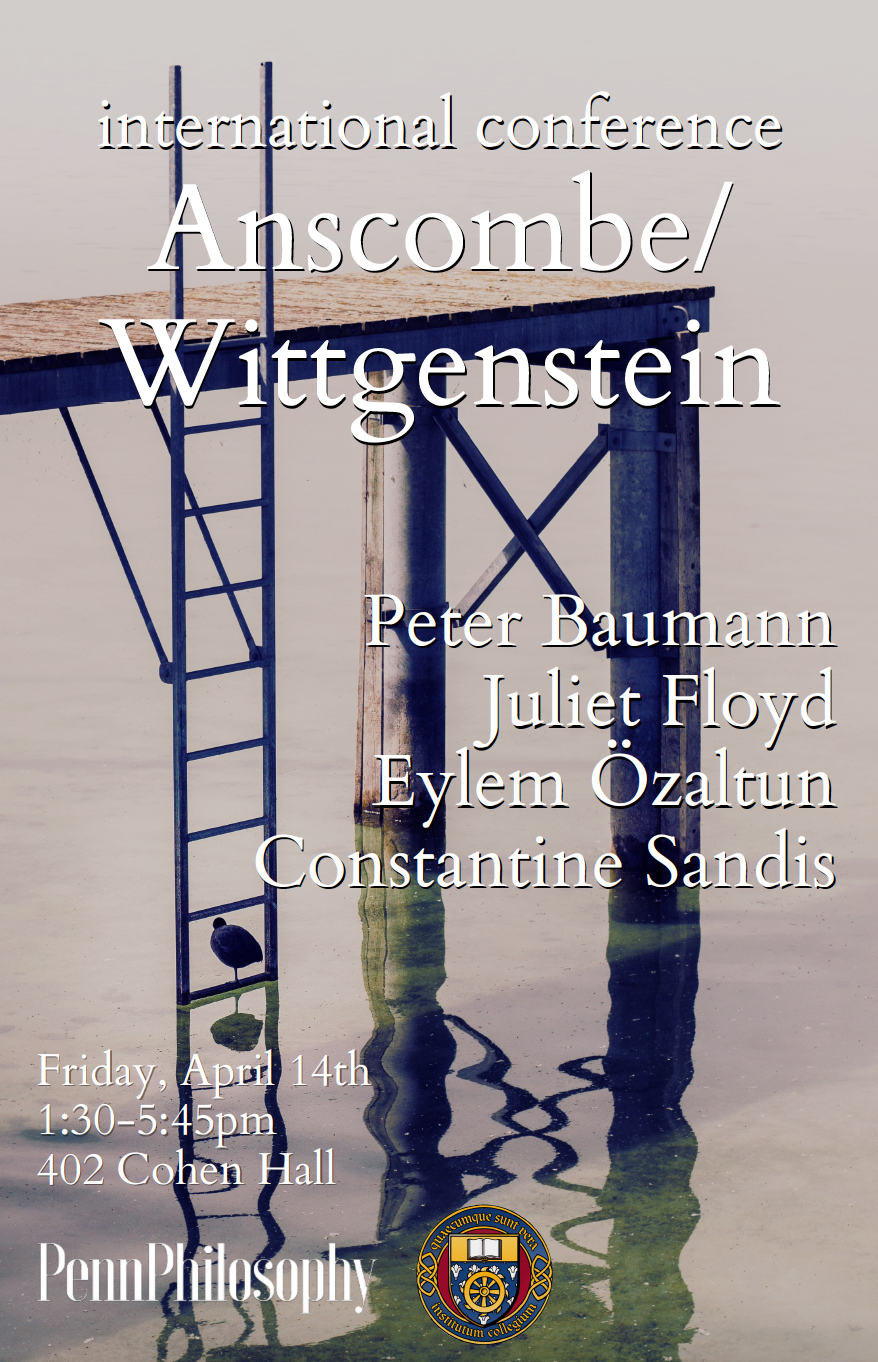
Penn Philosophy presents an international conference on Anscombe and Wittgenstein. Speaker: Constantine Sandis (University of Hertfordshire)Title: How to Move a MatchboxAbstract: Wittgenstein’s remarks against telekinetic pictures of action contain the seeds of a constitutivist approach to agency that would influence both Anscombe’s and Melden’s distinct accounts of agents as truth-makers. I consider the extent to which such agential truth-making may count as causal before concluding that Wittgensteinian forms of constitutivism hold the key to unravelling the debate between agent-causalists and event-causalists about action. Speaker: Peter Baumann (Swarthmore College)Title: Anscombe, Wittgenstein and the First PersonAbstract: Starting in the 1930s, Ludwig Wittgenstein developed some unorthodox views about first person attributions of mental states like pain and of epistemic states like knowledge. His focus was on the use of whole sentences and not so much on the use of the word “I”. Much later, Elizabeth Anscombe came up with equally unorthodox views on the first person. In contrast to Wittgenstein, however, she focused on the use of the word “I” and much less on the use of first-person sentences. Despite some similarities, their views on the first person and the reasons behind them are quite different. Some of the problems their views face are more closely connected. This paper discusses some main aspects and problems of their views. [It ends with some brief remarks connecting Anscombe’s few remarks on Kripke’s Wittgenstein with Ullmann-Margalit’s thought-provoking take on a remark in Wittgenstein’s Zettel on retroactive intentions. > This bit might or might not be included in the talk!] Speaker: Eylem Özaltun (Koç University)Title: The author of Intention against Descartes on I-thoughtsAbstract: Anscombe’s “The First-Person” is ordinarily taken to be an elaboration of Wittgenstein’s views on the first-person pronoun in Blue Book and later in Investigations. Hence very little attention is directed at the details of Anscombe’s own text. In particular, the fact that the main opponent of her paper is Descartes is rarely mentioned. Even when it is mentioned, the specific way in which she argues against Descartes’ cogito argument is not used to clarify her own thesis. In this paper I focus on how Anscombe argues against Descartes. Anscombe ends “The First-Person” by marking an important difference between her and Descartes’ investigations of “I”: they consider different sets of I-thoughts. Anscombe considers I-thoughts relating to actions, postures, and movements, not the Cartesianly preferred thoughts such as “I am thinking about thinking”, “I hope, envy, desire…”, and so on. She says “My way is the opposite of Descartes’…what were most difficult for him are most easy for me.” I claim that this opposite way is only available to the author of Intention and marks an important difference of Anscombe’s treatment of the first-person thought from not only Descartes’ but also Wittgenstein’s. To argue for this claim, I show that in “The First Person” Anscombe is presupposing some of the controversial and puzzling results of her book Intention. This entails some interpretive burdens: we need to study both works together, and an interpretation of Intention must be sensitive to the way in which its central theses are put to use in “The First Person”. In particular, I show that if an agent’s non-observational knowledge of her own actions is not the immediate knowledge of what happens (a highly controversial interpretation of one of the central theses of Intention), I-thoughts relating to actions cannot provide the opposite way of Descartes’ in which Anscombe works towards a philosophical understanding of “I” Speaker: Juliet Floyd (Boston University)Title: Reworking Wittgenstein: Anscombe and IntentionAbstract: Anscombe’s Intention (1957) was composed against the backdrop of a great deal of history of philosophy, but most locally, with regard to her methods, she was responding both to J.L. Austin and, more significantly, to her long engagement with Wittgenstein. This engagement included her auditing of Wittgenstein’s Lectures on Philosophical Psychology 1946-7, her translation, editing and study of the manuscripts of Philosophical Investigations (1st ed. 1953, “PI”) and Remarks on the Foundations of Mathematics (1st ed. 1957, “RFM”), and her work on the Tractatus, culminating in her masterful Introduction to Wittgenstein’s Tractatus (1959). I am interested in how Anscombe’s responses to these writings shaped some of her work in Intention. Anscombe picks and chooses what she wants develop, and what she wants to decline, illuminating new problems and questions along the way. As she knew well, the composition of PI emerged through Wittgenstein’s thinking about rule-following in RFM I, and many problems Anscombe explores in her own way in Intention are drawn from and rework ideas broached in these remarks -- Kripke suggested as much in acknowledging Anscombe’s importance for his 1982 book on Wittgenstein and rule-following, which Anscombe reviewed twice. But Anscombe respected the “anthropological” turn in Wittgenstein more deeply than Kripke, and did not take Wittgenstein to have advocated a consensus-based, Humean sceptical “solution” to rule-following. I want to see how this plays out in crucial parts of Intention.

 Department of Philosophy
Department of Philosophy